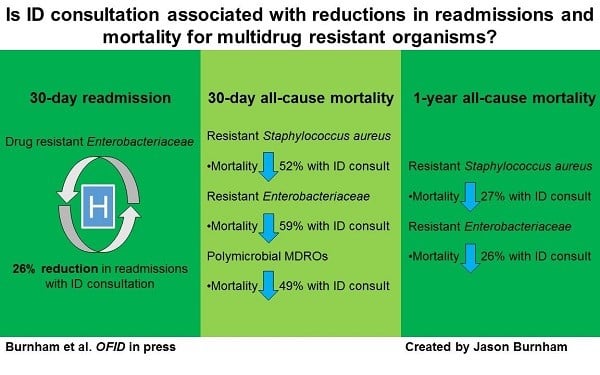Consultation with ID specialists associated with lower patient mortality for some infections
When infectious diseases (ID) specialists were involved in the care of patients with certain kinds of drug-resistant infections, the patients’ 30-day mortality rates were about 50 percent lower, according to a new study published in Open Forum Infectious Diseases. The findings provide additional evidence for the beneficial impact ID physicians have on patient care and outcomes, particularly when individuals have difficult to treat infections that are resistant to multiple antibiotics.
“These are serious infections that anybody can get and end up in the hospital,” said study author Jason P. Burnham, MD, of Washington University School of Medicine in St. Louis. “Understanding how we can help improve outcomes in patients like these is really important.”

For the single-center, retrospective study, researchers reviewed records from 2006 to 2015 for approximately 4,200 patients with infections resistant to multiple antibiotics who were treated at Barnes-Jewish Hospital, an academic medical center affiliated with Washington University School of Medicine. Patients with positive cultures for a multi-drug resistant pathogen from one of several different types of bacteria were included in the analysis: Enterobacteriaceae, Staphylococcus aureus, Enterococcus, Pseudomonas, and Acinetobacter.
Among patients with multi-drug resistant Enterobacteriaceae infections, ID consultation was associated with a 59 percent reduction in 30-day mortality. In line with previous research, ID consultation was also associated with a 52 percent reduction in 30-day mortality for patients with resistant S. aureus infections. For individuals suffering from several infections simultaneously, each one resistant to multiple antibiotics, an ID consult was associated with a 49 percent drop in 30-day mortality.
Even one year later, the involvement of an ID physician in treating a patient’s initial S. aureus infection was associated with a 27 percent reduction in all-cause mortality. For resistant Enterobacteriaceae infections, researchers found a similar 26 percent reduction in one-year all-cause mortality when a patient’s initial care included an ID physician. Among those with resistant Enterobacteriaceae infections, ID consultation was also associated with a 26 percent reduction in hospital readmissions in the 30 days following their initial hospital stay for infection.
For the other types of bacteria (Enterococcus, Pseudomonas, and Acinetobacter), small sample sizes limited the authors’ ability to associate ID consults with clinical outcomes. According to Dr. Burnham, larger studies are needed to better understand the role of ID consultants for these infections, though he said he suspects it would be positive. In addition, future research will clarify what specific aspects of care provided by ID specialists help patients the most, such as expertise in appropriate antibiotic use or application of relevant clinical practice guidelines.
As antibiotic resistance continues to increase, the specialized care provided by ID physicians will become even more integral to the daily operations of hospitals and for the promotion of patient and public health, Dr. Burnham said. “I think we're moving in a direction where having ID experts on board for these increasingly hard to treat drug-resistant infections will be necessary to ensure that our patients have the best possible outcomes.”
Fast Facts
- Researchers analyzed records for approximately 4,200 patients with infections resistant to multiple antibiotics from 2006 to 2015 at one academic medical center.
- Thirty-day mortality rates were about 50 percent lower among patients with certain multidrug-resistant infections who had infectious diseases (ID) specialists involved in their care.
- Among patients with Enterobacteriaceae infections resistant to several antibiotics, an ID consultation was associated with a 59 percent reduction in 30-day mortality.
Editor’s Note: The study was funded by the National Institutes of Health. The study authors’ affiliations, acknowledgments, and disclosures of financial support and potential conflicts of interests, if any, are available in the study.
Infectious Diseases Consultation Reduces 30-Day and 1-Year All-Cause Mortality for Multidrug-Resistant Organism Infections
https://academic.oup.com/ofid/article-lookup/doi/10.1093/ofid/ofy026
# # #
Open Forum Infectious Diseases launched in 2014 as a peer-reviewed, open access, online journal from the Infectious Diseases Society of America (IDSA), published by Oxford University Press. It focuses on the intersection of biomedical science and clinical practice, with a particular emphasis on knowledge that holds the potential to improve patient care in populations around the world. All content is freely available to all readers. To access the current issue, go to https://academic.oup.com/ofid/issue. Based in Arlington, Va., IDSA is a professional society representing more than 11,000 physicians and scientists who specialize in infectious diseases. For more information, visit www.idsociety.org. Follow IDSA on Facebook and Twitter.

